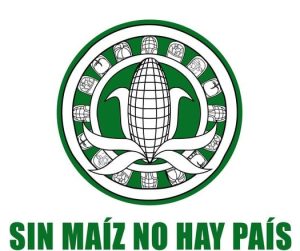Sign Today: ¡Defendamos juntos el maíz mexicano! Let’s defend Mexican maize together!
 June 2024:
June 2024:
The Mexican group Sin Maíz No Hay País (“without corn, there is no country”) asks Canadians sign the letter to the trade dispute panelists, in support of Mexico’s restrictions on GM corn. More than 50,000 Mexicans have signed this letter.
The letter and form are in Spanish: provide your first name (Primer Nombre), last name (Appellido) and email address/Correo electronico and then click the box “Mandar mi correo electronico.” Click here sign the letter.
Here is the letter in English:
To the trade dispute panel members:
Mr. Christian Häberli (president); Mrs. Jean E. Kalicki; Mr. Hugo Perezcano Díaz
We are hereby writing to you in connection with the dispute settlement panel between Mexico and the United States, derived from the Mexican government’s decision to forbid the use of genetically modified (transgenic) maize in human food and, specifically, in the nixtamal dough/tortilla chain, which is the basis of the diet of the Mexican people. The decision reached by the panel will impact not only the commercial relationship between both countries, but also the way Mexicans eat and their health, as well as the biocultural heritage of humanity.
Contrary to what has been suggested, the Mexican government’s actions for the protection of native maize and public health have a solid scientific basis. To date, there are no scientific studies or risk assessments that demonstrate the safety of consuming genetically modified maize in Mexico. Not only have the necessary tests not been carried out to assess its effects on eating habits, but without this certainty, the precautionary principle must be applied to protect the population. In our country, maize represents a staple food and the major source of carbohydrates. Therefore, the Mexican population has the right to consume maize without risk to their health and environment.
There are no conclusive studies that demonstrate that native maize will not perish in the face of the introduction of genetically modified maize. Nothing assures that our country’s diversity is not at risk. The lack of solid research regarding the impact of these modified seeds on the genetic diversity of native Mexican maize is alarming, especially if the genetic contamination that has already been documented to date becomes more widespread and deepens.
Mexico is the center of origin, domestication and constant diversification of this unique cereal. This work, based on invaluable knowledge passed down for millennia, has generated at least 59 maize breeds divided into thousands of varieties. From them comes 70 percent of the maize eaten in Mexico, mainly in the form of tortillas. In addition, this enormous diversity of maize has been incorporated into the food cultures of many countries around the world.
Native maize has adapted to the diverse geographical conditions present in Mexico, which occupies the 5th place in biodiversity in the world. They have also adapted to the geographical conditions of other continents. This biocultural feat must be fully understood and respected. It is necessary to emphasize that all varieties of hybrid and genetically engineered maize come from maize that originated in Mexico.
The biodiversity of Mexican maize and its wild relatives is essential for the next generations to have food alternatives that adapt to the effects of the climate crisis. If the biodiversity of Mexican maize is lost, humanity loses.
For this reason, the social struggle against transgenic contamination in Mexico, which has been going on for at least two decades, has led to actions that are reflected in laws, in the signing of international protocols and in lawsuits that have reached the Mexican Supreme Court of Justice and have been favorably resolved.
The consequences of the loss of biodiversity due to transgenic contamination are of such magnitude that it is not possible to quantify them in economic terms. This heritage of humanity is invaluable, since it implies the possibility of feeding millions of families who live thanks to this cereal. Moreover, for millennia, maize has been at the center of the culture, identity and life itself of the entire Mexican population.
Because the ban on the use of genetically modified maize in the dough/tortilla chain does not affect grain imports from the United States, since it is destined for fodder and industry, it is vital to get to the heart of the matter involved in the trade dispute. What is at stake here are two opposing visions: one for which maize is life, identity, culture; the other for which it is a substitutable and even dispensable commodity. You have legal elements within the USMCA itself that allow you to make a decision that takes into account that this dispute goes beyond a mercantile issue.
Esteemed panelists, it is within your power to ask both governments to carry out the scientific studies and risk assessments necessary to verify whether, as the United States has asserted, genetically modified maize is harmless. These studies are indispensable to address the core of the dispute. These analyses, since they affect the entire population, must be carried out without conflict of interest and with the participation of academia, indigenous peoples, civil society and consumers.
Ethics and the law require that you resort to the precautionary principle. We urge you to broaden your vision, to assume the responsibility you have before the world and to issue a historic ruling that opens new horizons in trade relations between countries, in accordance with the needs of our time. A time that demands a break with obsolete paradigms, in order to move towards a new, sustainable and fairer economic model that privileges and protects life.
Sincerely yours, (Click here to sign the letter – in Spanish: provide your first name (Primer Nombre), last name (Appellido) and email address/Correo electronico and then click “Mandar mi correo electronico.”)





